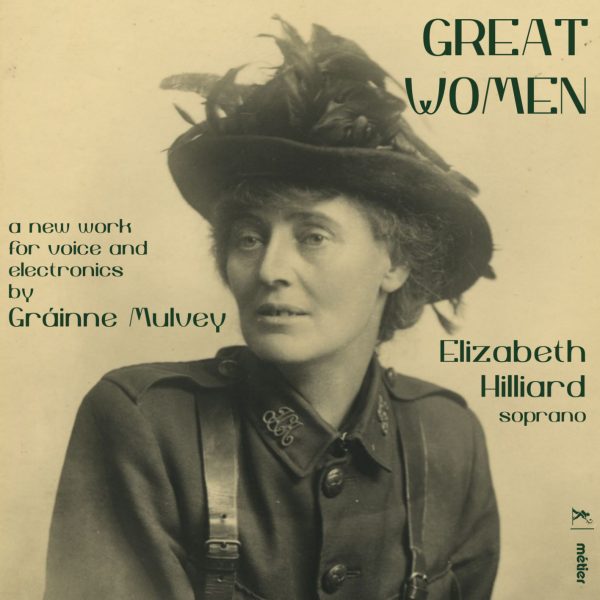IAWM Journal
Commissioned by the Dublin International Chamber Music Festival (with support from the Arts Council) to mark its 50th anniversary in 2020, Great Women is a powerful new work for voice and electronics by Grainne Mulvey, featuring Irish soprano Elizabeth Hilliard. The text is based on the words of four women who shaped the history of Ireland in the past and continue to shape it today.
Constance Georgine Markievicz (1868–1927) was an Irish politician, suffragette, and revolutionary who worked tirelessly on behalf of the poor and underprivileged. Markievicz helped plan the Easter Rebellion in 1916 and was the first woman to be elected to the Westminster Parliament. She also worked directly with people running soup kitchens and delivering fuel and turf to the poorest families in Dublin. Born an aristocrat, Markievicz used her power, privilege, and position to help others as she fought for women’s rights and Irish nationalism.
Rosie Hackett (1893–1976) was an activist for the trade unions in Ireland. Unlike Markievicz, Hackett was born into a working-class family and was raised by a single mother after the early death of her father. She was a founding member of the Irish Women Workers Union, was present at the printing of the 1916 Proclamation of the Irish Republic, participated in the Easter Rebellion, and served as an active member of the Irish Citizen Army. Hackett worked tirelessly for better and safer working conditions and for pay raises by organizing walkouts and other activities in support of strikers.
Professor Mary Robinson (b. 1944) was the first woman president of Ireland (1990–1997). She also served as the United Nations Commissioner of Human Rights (1997–2002) and Chancellor of the University of Dublin (2002–2019); in addition, she worked with her own foundations. Robinson transformed Ireland by decriminalizing homosexuality, legalizing contraception and divorce, enabling women to sit on juries, and securing the right to legal aid in civil legal cases.
Mary McAleese (b. 1951) succeeded Robinson as president (1997–2011), and she was the first person from Northern Ireland to hold that position. McAleese is currently Professor of Children, Law and Religion at the University of Glasgow and Chancellor of Trinity College in Dublin. Throughout her fourteen years in office, she has focused on building bridges both within differing groups in Ireland and between Ireland and Britain.
The tape for Great Women, created by Mulvey, draws on poems, letters, and speeches of the four above-mentioned remarkable women. Some of the texts are read by Elizabeth Hilliard and are treated in a manner similar to musique concrete, where they are modified and manipulated to form a sound collage, and others are direct recordings of the women themselves speaking. Mulvey also makes use of electronic sounds to fill out the tape, but the focus remains on the words of the women. The live voice part, realized by Elizabeth Hilliard, includes many extended vocal techniques such as overtone singing, speech, text fragmentation, and so forth, as well as beautifully-sung melodic lines. The tape part and the live vocal part are so closely interwoven that it is, at times, difficult to tell which is which. Together, they create a shared vision of the women who have helped build and continue to shape modern Ireland.
Great Women begins with a sense of urgency, as layered vocalizations gradually unfurl to reveal the opening statement by Markievicz: “We have got to get rid of the last vestige of the Harem before woman is free as her dream of the future would have her” (liner notes, 4). This call to action is followed by a new dimension with a delicate texture. There is a sense of timelessness as drones provide the accompaniment to the virtuosic vocal part, which leaps from one register to another. As we move through the piece, we are met with moments of urgency, repose, timelessness, and elegance. We are reminded of the fragility of human nature and the strength of flexibility. We hear Mary Robinson evoke the fifth province, a place within each of us that allows reconciliation and healing. Mary McAleese speaks of a nation that has been transformed. As the piece closed, I felt as though I had been on a journey and that I had met, in one way or another, these great women and had been transformed by their actions and work.
The performances on Great Women are outstanding, with a stunning, virtuosic performance by Dublin-based soprano Elizabeth Hilliard. She brings the words of the four women to life with clear conviction, and she switches between different vocal techniques with ease, ranging from a guttural speaking voice to the most delicate filigree. Her high singing range is superb, as her voice blends into the electronics to create new textures. Hilliard and Mulvey have collaborated on numerous projects, and their close relationship is apparent in this recording.
@divineartrecordingsgroup
A First Inversion Company
Registered Office:
176-178 Pontefract Road, Cudworth, Barnsley S72 8BE
+44 1226 596703
Fort Worth, TX 76110
+1.682.233.4978












